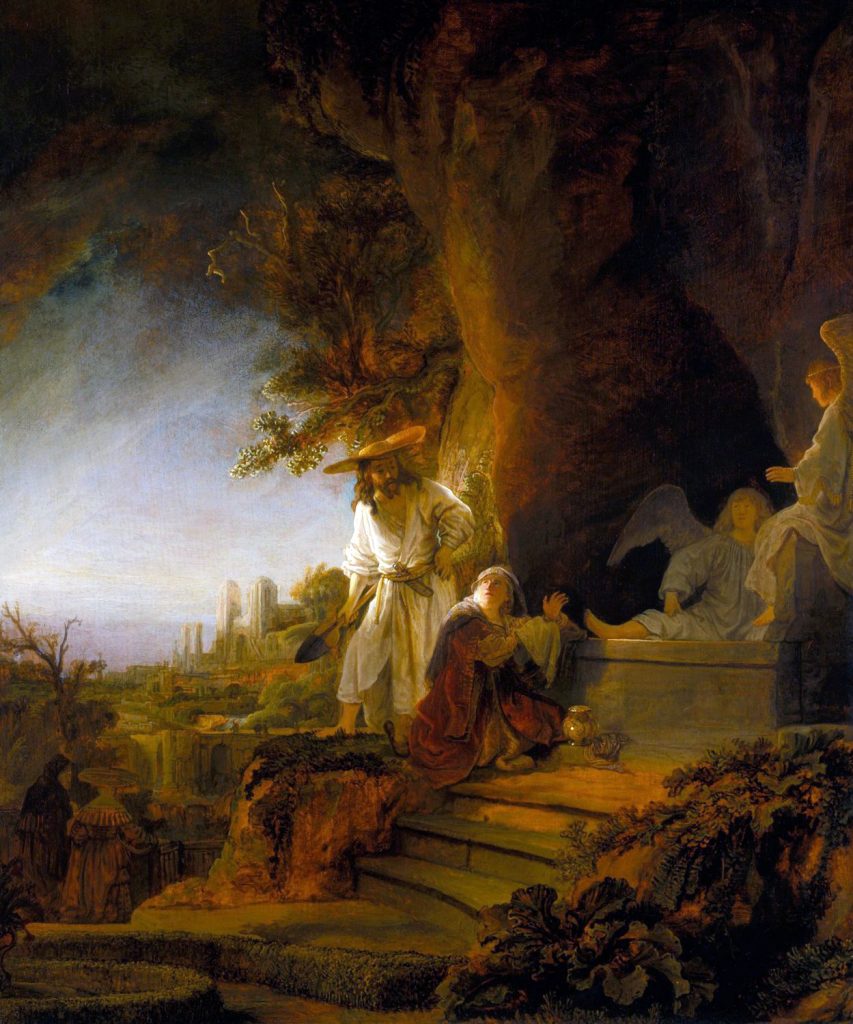Today’s Mass offers us the resurrection account from John’s Gospel (20:11-18). This account evokes a persistence on the part of the Magdalene to remain at the tomb. She had visited earlier and found it empty, and ran to tell Simon Peter. She obviously returned, and remained, even after Peter and ‘the Beloved Disciple’ had departed.
This is an important lesson for us in our faith journey – to persist in our own desire to ‘see the Lord.’
John’s Gospel places the burial place of Jesus in a garden (John 19:41) which is significant. The creation account recalls the beauty of God’s handiwork, in that from the beginning, all was in perfect harmony, and Adam and Eve abided in this harmony with God in the Garden.
Then, sin entered the world, disturbing this harmony between humanity and God, and paradise was lost.
Now, the Risen Christ comes to restore humanity to this Garden of Harmony with God through his greatest work and ministry – that of our Salvation. Rembrandt captures this notion of Jesus as the Gardener in the image used for this post – going so far as to place a spade in the hands of the Risen Jesus. John evokes this image when he claims that Mary Magdalene mistakenly thought that the Risen Jesus was the gardener. (John 20:15).
Mary Magdalene seems so lost in her grief that she is incapable of recognizing the Risen Jesus. Some commentators believe this is what lies behind the instruction of Jesus to her: “Stop holding on to me.” Mary has yet to comprehend the significance of the Resurrection – needing to let go of her present state of mind and embrace the reality of the Resurrection – along with all that it promises.
This is a pervasive challenge that still faces us today. Are we so deeply disgusted with the state of our world or our own lives that we are incapable of recognizing the Risen Jesus and the promise of what the Resurrection offers us? How does the instruction of Jesus to Mary Magdalene “Stop holding on to me” speak to each of us? Do we ‘grieve’ over certain worldly events or personal moments of our own history in a manner that is not open to allow the Risen Jesus to transform these moments? To transform our own hearts and our notions of what God is truly capable of accomplishing?
Perhaps today, we are being called by name by the Risen Jesus precisely so that he can help us let go of certain things so that we can instead cling to our faith in the Resurrection more securely.
Just as the Paradise that was lost is restored by Jesus in the Garden of the Empty Tomb, he approaches each of us in order to restore us to a renewed relationship with God, with others, and with the world around us.
Peace, and Happy Octave!
+pde
5